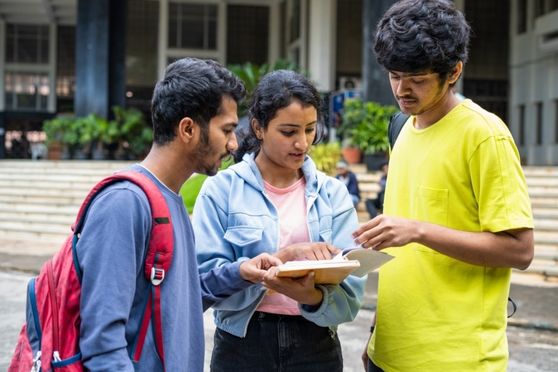Overcoming the Language Barrier: EdTech Solutions for Indian Students in English-Dominated Higher Education Abroad


Many Indian students dream of studying abroad, attracted by the promise of world-class education and international exposure. In recent years, this dream has become a reality for an increasing number of students. In 2022, over 1.3 million Indian students pursued education overseas, marking a staggering 68% increase compared to previous years. While the allure of global universities is undeniable, many Indian students may face a formidable obstacle - the language barrier. Thankfully, EdTech has stepped in as a lifeline, helping you overcome linguistic challenges.
The language barrier is more than just a matter of vocabulary; it encompasses comprehension difficulties, communication hurdles, writing skills, and the subtleties of cultural context. While many Indian students are proficient in English, academic English demands a higher level of fluency, precision, and nuanced understanding. Navigating this linguistic terrain can profoundly impact classroom participation, academic performance, and overall confidence.
In the digital age, EdTech has ushered in new learning methods and produced remarkable results, emerging as a powerful ally in overcoming the language barrier. In 2021, the global EdTech industry secured an astonishing $20 billion in funding, signaling a transformative era. Let’s delve into specific EdTech solutions that are revolutionizing language learning for Indian students pursuing higher education abroad.
1. Language Learning Courses:
Modern EdTech platforms offer tailored language courses designed to achieve specific goals, such as enhancing academic vocabulary or honing communication skills. These courses include assignments that simulate real academic situations, equipping students with the language skills necessary for higher education abroad.
2. Online Tutoring Platforms:
One-on-one virtual tutoring sessions with experienced English language instructors allow students to address their weaknesses, receive personalized guidance, and boost their language confidence. These platforms also enable students to practice conversational English with native speakers, improving their speaking and listening skills.
3. E-Libraries and E-Textbooks:
Over time, EdTech has provided access to comprehensive reading materials. E-libraries and E-textbooks serve as valuable resources, offering students an extensive digital repository of English-language content that eases the transition to English-dominated academic materials.
4. Writing Tools:
Several EdTech platforms focus on enhancing writing skills, offering features to identify and correct grammar mistakes. These tools also assist students in adhering to specific writing styles and providing explanations, thereby improving comprehension and writing proficiency. Additionally, they contribute to boosting confidence in writing, effectively breaking down the language barrier.
5. AI-Powered Language Assistance:
AI-driven language learning tools play a pivotal role in expediting the learning process by providing instant feedback and pinpointing areas for improvement.
Integrating EdTech into language learning presents numerous advantages:
1. Personalization:
EdTech adapts to individual learning styles and paces, ensuring effective language acquisition. It also eliminates the fear of judgment, as learners can access resources privately from the comfort of their homes.
2. Accessibility and Affordability:
These tools are readily available to students across India, bridging geographical gaps and offering equal opportunities for language improvement. Moreover, the digital revolution, marked by affordable data access, has democratized high-quality language education, making it accessible with a simple click.
3. Instant Feedback:
EdTech platforms provide instant performance analytics, accelerating the learning process. For instance, at the end of a test, scores are displayed for various aspects of language acquisition, including reading, writing, speaking, and listening.
4. Global Community and Cultural Integration:
These platforms foster a global community of learners, facilitating cross-cultural interactions. During one-on-one sessions, students and tutors often discuss their respective cultures, beliefs, and traditions, promoting confidence-building and cultural integration.
5. Supporting Diverse Learning Styles:
EdTech is versatile and caters to all learning styles, be it visual, auditory, or kinesthetic. For instance, some platforms are specifically designed to assist blind students in typing, making the learning process more inclusive. This adaptability enhances language acquisition by tailoring the learning experience to each student's preferences.
6. Continuous Learning and Lifelong Skills:
The benefits of EdTech extend beyond academic success, equipping students with lifelong language skills that enhance their professional careers and cultivate a culture of continuous learning.
In conclusion, EdTech represents a revolutionary force in the educational landscape for Indian students pursuing higher education abroad. EdTech not only dismantles language barriers but also unlocks a realm of opportunities. This transformative development holds particular significance, given that India boasts the world’s largest diaspora population, with approximately 16 million Indians residing abroad. Armed with the right EdTech tools, Indian students are poised to make their mark on the world stage, fostering a brighter and more interconnected future.